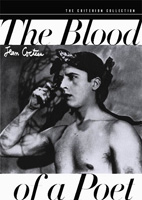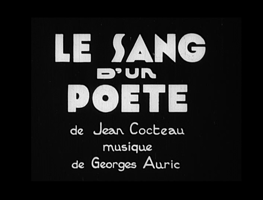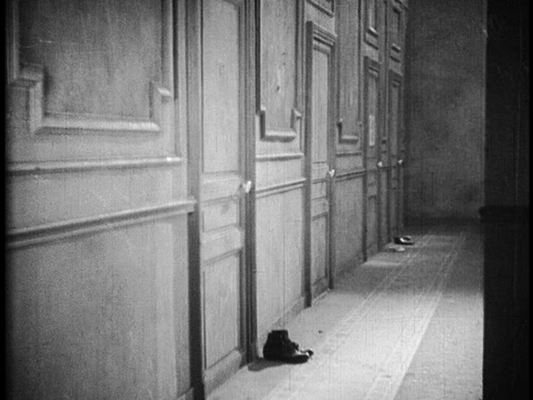2000:  (out of print 4/2010)
(out of print 4/2010)

written and directed by Jean Cocteau
Criterion #67.
= disc 1 of 3 in Criterion #66, “The Orphic Trilogy.”
The Blood of a Poet.
It seems that in 1929 Jean Cocteau and Georges Auric were both at a party hosted by big-time art patrons Charles and Marie-Laure, Vicomte and Victomesse de Noailles (I know, they look like a lovely couple, but keep in mind he was gay), and at this party, Auric announced his desire to write music for a cartoon, if only someone would make one. His hosts nominated Jean Cocteau, pre-eminent doodle-master (with whom Marie-Laure was reportedly infatuated (yes, also gay)), as just the person for the job.
Cocteau apparently counter-proposed that he make not a cartoon but a live-action film that would be as fantastical as a cartoon. This proposal was deemed acceptable, and the Noailleses cheerfully handed over one million francs. “Don’t you two come back until you’ve made some completely crazy art. That’s our thing. That’s what we do.”
And so Cocteau, who had no film experience whatever, made this, and Auric scored it, and here it is.
Watching it, you can tell: this is a very pure product of the uppermost echelons of aristocratic decadence. That’s not a bad thing. I’m using “decadence” in a very clean sociological sense, without anger.
I think high-surrealist dream films are great fun, in principle. In fact I wish there were more of them, so that we wouldn’t have to be as precious about the few we have. If this movie were just one among hundreds, it would be easier for me to simply enjoy the parts that work and forget the rest. But knowing that this kind of thing is relatively rare, I feel obligated to try to make the most of it. Surrealism doesn’t grow on trees, and there are only so many Vicomtesses to go around.
My feelings are nearly the same as they were about Cocteau’s Beauty and the Beast:
The most rewarding things here are the unearthly atmosphere and the compellingly simple magic effects: the wall is actually the floor and the girl flies up it; a mirror is actually a pool of water and the guy falls into it; the eyes are actually painted on their closed eyelids.
The thing that gives me the most difficulty is the editorial rhythm, which seems pretty much neglected as a dimension of craft. Some shots are too long, some are too short. Mostly too long. Sequences tend to drag on well after we’ve gotten the point. Jean doesn’t notice or care. It always surprises me when musicians, poets, or filmmakers don’t have a passion for rhythm; to me it is the first principle in all three arts.
However, in his preface to the screenplay, written in 1946, we read:
The innumerable faults of The Blood of a Poet end up by giving it a certain appeal. For example, I am most attached to the images. These give it an almost sickening slowness. When I complained of this recently to Gide, he replied that I was wrong, that this slowness was a rhythm of my own, inherent in me at the time I made the film, and that changing the rhythm would spoil the film.
He is undoubtedly right. I am without doubt no longer sensitive to the “element of God” that he speaks of, and that this film uses and abuses. As I know it far too well, I can only observe the acts, and the slowness with which they follow each other hides the rest from me.
At this point in my life, I think I have a feeling for what he means by “the element of God,” and I can see some sense in his equating the slack editing with the poetic truth, which is to say the poetic trance. In fact I experienced it. I watched the film twice, and both times I found that my critical reservations were strong at first, but eventually gave way to a sleepiness that is their obverse. This happens in an instant, after which everything seems different. Naturally, my sleepy side is more in sympathy with the state of mind represented by the film, and so too with the “almost sickeningly slow” rhythm — or un-rhythm — of the film itself, which nicely complements a state of trance.
Which means that maybe my initial reservations about the editing were wrong after all. Or rather, maybe my critical thoughts exist as a closed system within me, and have little to do with the film. The thoughts just are, and can only await that moment of inversion that reveals their hypnagogic underside.
(Exactly this sort of flip-flop transition is portrayed in the film, I think. When the poet sleeps, a spinning mask is shown, with tears on the front and Cocteau’s own likeness painted on its concave reverse. These sort of pat images of duality have started to make a lot more psychological sense to me.)
All the same, I am still heartened by the implication, between the lines in the quote above, that Cocteau at least momentarily considered re-editing the film to improve the rhythm. Because that’s exactly what I was doing in my head while I watched (“I would cut away… now”). Or at least that’s what I was doing before the moment of turnover, before my mind started floating alongside the movie, up a wall that’s actually a floor, rolling around on a ceiling that’s actually a wall.
The potential problem with watching all that floating while floating is that floating doesn’t care about anything very much. I don’t need any fancy Frenchy stimuli to make my dreams sufficiently dreamy: if I’m dreaming, then I’m dreaming great, and I know it. Once I slip away, I stop caring what’s on screen. My inner poet knows full well that poetry doesn’t matter in the least, and that it’s completely unnecessary to pay attention to, say, this movie. There’s something a little self-destructive about dream-films; if they’re authentic, they erase their own audience.
That’s why I watched it twice: I had to pass through it again before I felt confident that I’d actually seen it.
But I think that’s fine. I certainly didn’t notice Jean Cocteau or The Criterion Collection getting annoyed with me for drifting. And I am always grateful to be encouraged to slip away. That can be what this artwork is.
So that’s what it is, but what’s it about? Well, M. Cocteau would deny that it’s about anything. And I think that’s right. It’s a pitfall of the critical mind to think that a question like “what’s it about?” is pure and necessary, when in fact it is deeply prejudicial. What is a hypnotist’s pocket-watch about?
Nonetheless, this is Cocteau’s trance and his psyche is doing the catering, so the psychodrama that plays out onscreen is, if not about anything, certainly specific. It seems that Cocteau was preoccupied throughout his life with the risks an artist takes when he exploits his inner poetry, lets it leave his body. That’s the subject here; that’s what the “blood” of the title refers to.
The poet in the film is playing a game of cards against a glamorous Muse; lacking a good enough hand, he is compelled to appease her by shooting himself in the temple, which creates a wound in the form of Cocteau’s signature star, through which blood then pours. This elicits the applause of a society crowd watching from box seats. (Originally this society crowd included the Noailleses themselves, but apparently their families objected to them being shown celebrating a suicide, so the scene was reshot.)
It would be easy to accuse Cocteau of being absurdly spoiled and self-pitying to have portrayed himself as a sacrificial victim, given that he lived in a milieu of society parties and million-franc commissions for work that is nothing less than complete self-indulgence. But I don’t believe in those sorts of accusations anymore. I have no doubt that this is not a calculated self-dramatization but an authentic self-revealing. And revealing himself authentically is the very thing that scares him. He was genuinely afraid, it would seem, of just those sorts of accusations, of losing his private sense of himself in the unsympathetic, unseeing eyes of others. But he suffered that fear for the sake of art. That is the nature of the self-sacrifice seen in the movie. To me it seems entirely sincere.
(My skeptical comment about La belle et la bête, that it had “an unpleasant Siegfried-and-Roy air of unchecked homosexual ego” about it, is no longer something I would say. Ego isn’t a threat to me or society; nobody is obligated to “check” it. Last year I read a nice essay that reminded me that even Siegfried and Roy can be taken seriously. They are people, after all.)
Cocteau is fixated on his own inner fragility because he strongly believes in using his innermost feelings as the fuel for his art, but it makes him nervous to do so, which is what generates the fragility in the first place. This circularity is reflected in the work; the art can’t help but begin to take on a self-obsessed quality. To him, the ultimate self is something he feels obligated to reveal and also afraid to reveal, so, like a vitreous floater, it is always flitting out of reach of his fearful approach. Seeking it, questing after it, he feels like he is flirting with half-benevolent, half-threatening gods, enigmatic masked figures of myth that toss his emotional fate from hand to hand. He comes to find the experience of thinking about himself mysterious, ominous, important. Art for Cocteau is self-exposure, self-exploration, self-wonder. Self self self, with integrity.
I believe that by disc 3, Testament of Orpheus, in which he stars, we’ll be watching him essentially eat his own tail right on screen. But I’ll have to wait and see.
That all said, this egoistic thread of the work does still pose problems for me. As I said in the Rushmore entry: despite what it might seem, the only thing actually unpleasant to the audience about self-obsession is the anxiety that it implies. But that unpleasantness can be real. I think a more secure Jean Cocteau would have inserted his actual name and face and signature less often, and part of me involuntarily winces — albeit lightly — whenever they appear.
The cosmic mystique of “Jean Cocteau”: this is the thing that I have least in common with him, and yet he’s made it central to the work. If he had had the freedom of mind to focus more on the experience of having a life, rather than the experience of having a certain identity, there would be more for us to share.
But I do respect his sincerity. This is what was inside him, so here it is.
The movie had plenty of stuff to offer me directly. When the poet passes through a mirror into the hallway of a seedy hotel with screwy gravity, and peers through keyholes at one surreal tableau after another, I don’t feel that there are any anxieties standing between me and the image. This is a very easy subconscious landscape for me to visit. I know it well; I’ve dreamed it myself, more or less. Magritte is full of it. It’s in Yellow Submarine, too. I think it was on Muppet Babies, for that matter. Going to door after door and seeing weird stuff. It’s primal.
It’s all primal, if you can get there. If you’re really open enough, I imagine it’s possible to genuinely feel that you are Jean Cocteau, for the movie’s purposes. I didn’t get all the way there, but that’s okay too. It’s just a movie. Only a 50 minute one, in fact.
That’s 20,000 francs per minute. $785 in 1930. (So $11,189 per minute, adjusted.)
Connection to previous movie: the director finds an excuse to insert his own lovingly-cultivated handwriting.
The DVD also offers a 66-minute film about Cocteau’s life, made in the early 80s but built around autobiographical interview footage from one of the last years of Cocteau’s life (he died in 1963). It only touches on Blood of a Poet briefly, and prematurely gives away big chunks of footage from Testament of Orpheus, so maybe I should have waited to watch it. Probably it would have gone on the last disc in the boxset if content were the only consideration, but this is the shortest of the three films and so its disc has the most room for bonus materials.
I was tickled by the documentarian’s use of construction paper to create a colorful abstract background for cut-out historical photographs (of ballet costumes, etc.). I don’t have occasion to think about construction paper very often these days. As a backdrop it offers access to a distinct imaginary textural space that was familiar from my childhood.
I had a perfectly nice time with this documentary film and with Cocteau’s company in it — it’s fun to hear unpretentious anecdotes about the personal manners of Diaghilev and Satie and the like — but even having been through it, Jean Cocteau remains a fairly peripheral figure for me. He was clearly a conscientious artist with genuine talents, but there’s just something insular about his body of work. I said that the only turn-off in self-involvement is anxiety, and I stand by that, but it can also have an unfortunate constraining effect on the spiritual breadth of your output. I kind of get what his thing was, and I can only make so much use of it.
I felt similarly indifferent about the biographical life casually documented here. And he himself said that his outer self was of no significance; only the inner poetic self counts. His inner poetic self does seem like it had something to offer me: some sweet floaty naptime. I’m always game for more. Let’s see how the next one goes.
This is Georges Auric’s third Criterion appearance. He’ll be back again immediately for our next two selections, and then according to the Criterion database he’ll be returning five more times after that. I hadn’t realized how prolific he was as a film composer. His music never makes the impression of being spectacularly inspired, but it seems like he always brought a certain level of cultured intelligence and taste to the work. In the world of film that’s not to be taken for granted.
The project originated in his desire to write cartoon music, and despite the fact that it went in rather a different direction, it seems like maybe he just did what he wanted and wrote a suite of cartoon music anyway. The score is full of vaudevillian comic sparkle that has nothing the least bit Cocteau-dreamy about it. Whereas it can easily be imagined to have Mickey Mouse in mind. It never particularly matches the action, and has frequently been heavily hacked up to try to contrive some sync. And even so it still often seems incongruous — not purposefully surrealist, just incongruous. I don’t know what you pictured when you heard that little excerpt a moment ago, but I’ll bet it wasn’t this!
I suspect Auric — whose name is after all on the title card right next to Cocteau’s — did not respond to the footage itself, but to the scenario in the abstract (if that!), and then made his own free and equal submission to the project. It’s unfortunate that Cocteau had to do such clumsy meddling with the soundtrack to get it to fit, because the music seems quite charming as a little ballet in its own right. I think complete it would be about 25 minutes. It deserves a clean rerecording, which it’s never received. The original recording was never released intact either, and is presumably lost at this point.
Despite the relative paucity of dialogue and sound effects, selecting a listenable cue still turned out to be hard, because everything is eventually interrupted in one way or another. The music for the opening titles would seem to be the thing, except that the whole film begins with a terrible hiccuppy edit into the middle of some music already in progress. Later, pieces of the same material recur, in a nearly identical performance, but with a proper beginning. I gradually came to suspect that Cocteau had constructed the different cues by variously editing multiple recordings of the same music. That at any rate is the premise behind the restoration work I did to try to make something listenable for our excerpt.
I have had to make many (hopefully inaudible) edits, combining audio from three different places in the movie, to try to restore a musical continuity. Unfortunately right before the end there is still one hiccup that I was not able to heal because the missing audio is nowhere reused. It can serve to give you some sense of what I was up against.
I guess we’ll call this Main Title and Introduction, which is where the bulk of it appears. But is that really what it was composed to be? I don’t know.
Performance is conducted by Édouard Flament, leading the “Orchestre Flament,” which was probably just a pick-up group.
